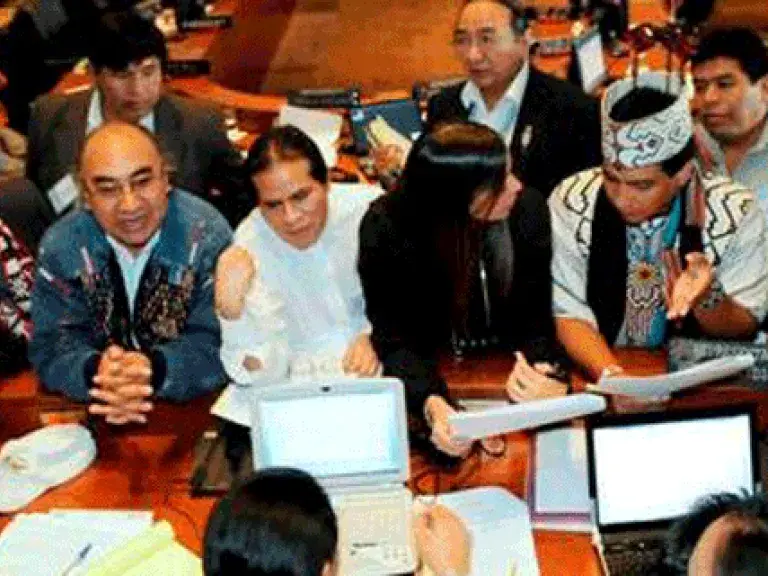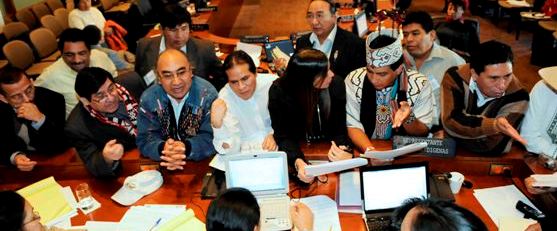
 The Indian Law Resource Center is greatly concerned about the widespread violation of indigenous rights in the Americas, making the need for a strong American Declaration on the Rights of Indigenous Peoples more pressing than ever. We strongly urge the Organization of American States (OAS) and its member states to commit to the adoption of a strong American Declaration on the Rights of Indigenous Peoples by actively engaging in negotiations. The American Declaration would affirm the right of self-determination, including rights to lands, territories, and natural resources, and it would include provisions that address the particular situation of indigenous peoples in the Americas. The American Declaration would address specific issues not included in the UN Declaration such as expanding gender equalityand the rights of indigenous peoples in voluntary isolation or initial contact. The adoption of a strong American Declaration is long overdue.
The Indian Law Resource Center is greatly concerned about the widespread violation of indigenous rights in the Americas, making the need for a strong American Declaration on the Rights of Indigenous Peoples more pressing than ever. We strongly urge the Organization of American States (OAS) and its member states to commit to the adoption of a strong American Declaration on the Rights of Indigenous Peoples by actively engaging in negotiations. The American Declaration would affirm the right of self-determination, including rights to lands, territories, and natural resources, and it would include provisions that address the particular situation of indigenous peoples in the Americas. The American Declaration would address specific issues not included in the UN Declaration such as expanding gender equalityand the rights of indigenous peoples in voluntary isolation or initial contact. The adoption of a strong American Declaration is long overdue.
The Working Group in charge of drafting the American Declaration will hold its 14th negotiation session in Washington, D.C from April 18-20th to reach consensus on key provisions of this proposed legal framework. The working group is composed of all OAS-member countries, such as the United States, and indigenous representatives from throughout the Americas.
A strong American Declaration is crucial to upholding and protecting the fundamental rights of indigenous peoples. Indian and Alaska Native nations face grave violations of their human and treaty rights in the United States and throughout the Americas. In the United States, the government confiscates Indian lands in violation of the Constitution; one in three Indian and Alaska Native women is raped in her life time; and developers infringe upon Native peoples’ cultural and spiritual indigenous human rights by desecrating sacred sites such as the San Francisco Peaks, home to the Hopi Katsinas and the Apache Gaan and spiritually significant to at least 11 other tribes. The situation is even more appalling in Mexico and Central and South America. Extractive industries threaten the survival of many indigenous nations throughout the Americas, including the Maya Q’eqchi’ in Guatemala. Forest conservation initiatives, such as REDD+, present additional risks to the rights of indigenous peoples. Indigenous peoples own, or live within, much of the developing world’s standing forests, but they often lack legal title to their lands, making their lands vulnerable to takeover by governments or conservation groups intent on developing REDD+ programs.
The United States has historically played an important leadership role in this hemisphere; unfortunately, the United States has effectively stepped out of the negotiation process by its previous decision to observe and not actively engage within the negotiations. Although President Obama announced the United States support for the UN Declaration on the rights of Indigenous Peoples on December 16, 2010, actual implementation is pending. The administration could demonstrate its strong commitment to human rights by implementing provisions in the UN Declaration and supporting the adoption of a strong American Declaration.
A sound American Declaration is much needed to recognize and secure indigenous rights, including the right of self-determination, treaty rights, rights to lands and resources, and more. It will address the particular regional issues in the Americas that are not dealt with in the UN Declaration on the Rights of Indigenous Peoples. The draft American Declaration already includes provisions on gender equality, violence against Native women, and indigenous peoples under internal armed conflict that are not in the UN Declaration and are of particular importance to indigenous peoples in the Americas.
The Center encourages the United States government to re-engage in the OAS process and take a leadership role within the Working Group. The American Declaration will help stop existing and guard against future human rights violations occurring in the Americas. We will continue to organize our allies to apply pressure and demand full participation by states. To that effect, we hope tribal leaders will attend the negotiations this year to help us attain our goal of seeing the OAS adopt a strong and principled American Declaration on the Rights of Indigenous Peoples. Further information on the negotiation session can be found online, and the registration form is available here.
The vulnerability of democracy, justice, and the rule of law in this hemisphere is evident in the widespread and gross human rights violations now occurring against indigenous peoples in the Americas. To truly establish itself as a world leader in the field of human rights, the United States must uphold, promote, and protect the fundamental rights of all indigenous peoples of the Americas.
Sincerely,
Armstrong Wiggins
